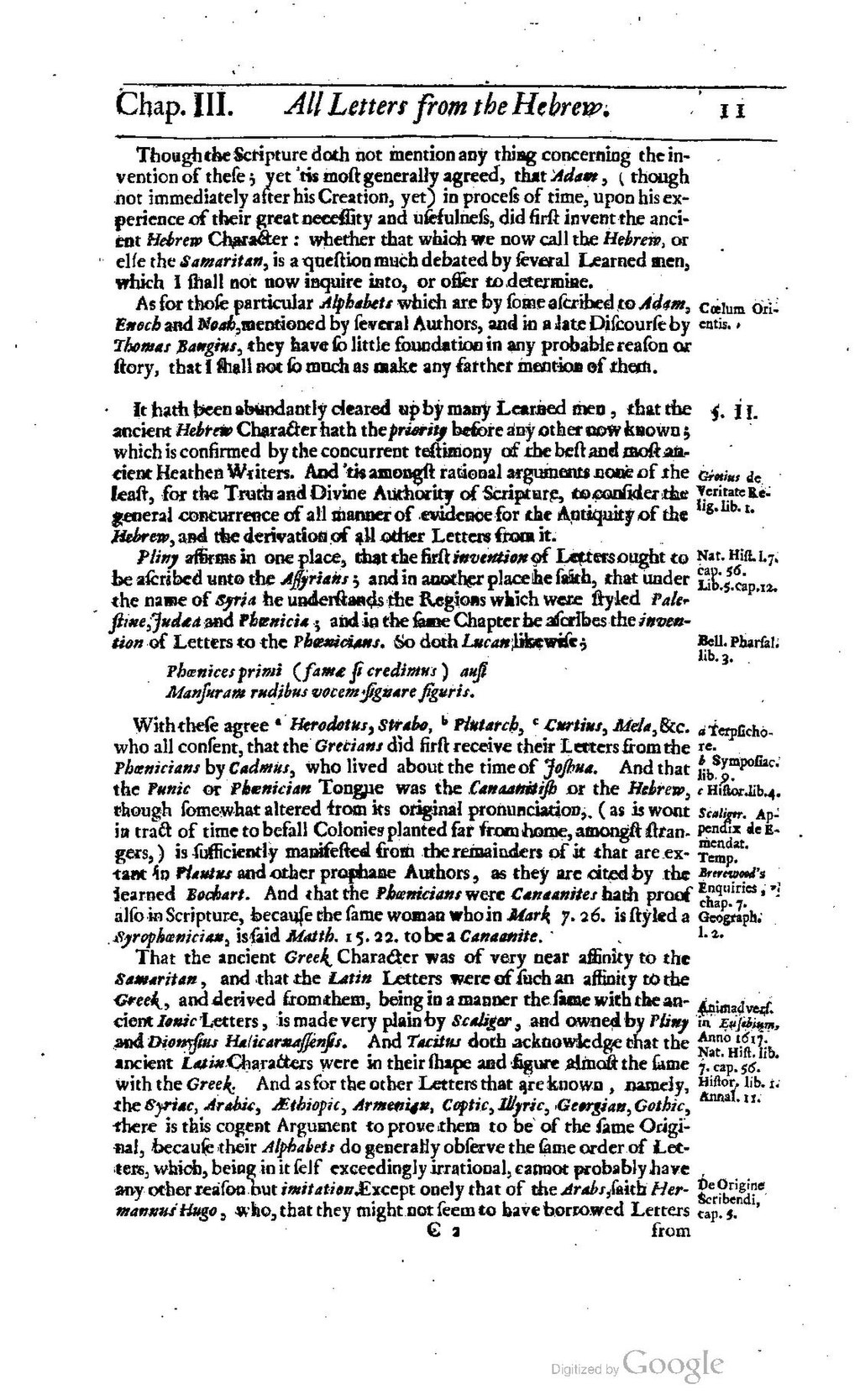Though the Scripture doth not mention any thing concerning the invention of theſe; yet 'tis moſt generally agreed, that Adam, (though not immediately after his Creation, yet) in proceſs of time, upon his experience of their great neceſſity and uſefulneſs, did firſt invent the ancient Hebrew Character : whether that which we now call the Hebrew, or elſe the Samaritan, is a queſtion much debated by ſeveral Learned men, which I ſhall not now inquire into, or offer to determine.
It hath been abundantly cleared up by many Learned men, that the ancient Hebrew Character hath the priority before any other now known; which is confirmed by the concurrent teſtimony of the beſt and moſt ancient Heathen Writers. And 'tis amongſt rational arguments none of the leaſt, for the Truth and Divine Authority of Scripture, to conſider the general concurrence of all manner of evidence for the Antiquity of the Hebrew, and the derivation of all other Letters from it.
Pliny affirms in one place, that the firſt invention of Letters ought to be aſcribed unto the Aſſyrians; and in another place he ſaith, that under the name of Syria he underſtands the Region which were ſtyled Palestine, Judea, and Phœnicia; and in the ſame Chapter he aſcribes the invention of Letters to the Phœnicians. So doth Lucan, likewiſe;
Phœnices primi (fame ſi credimus) auſi
Manſuram rudibus vocem ſignare figuris
With theſe agree a Herodotus, Strabo, b Plutarch, c Curtius, Mela, &c. who all conſent, that the Grecians did firſt receive their Letters from the Phœnicians by Cadmus, who lived about the time of Joſhua. And that the Punic or Phœnician Tongue was the Canaanitiſh or the Hebrew, though ſomewhat altered from its original pronunciation, (as is wont in tract of time to befall Colonies planted far from home, amongſt ſtrangers,) is ſufficiently manifeſted from the remainders of it that are extent in Plautus and other prophane Authors, as they are cited by the learned Bochart. And that the Phœnicians were Canaanites hath proof alſo in Scripture, becauſe the ſame woman who in Mark 7. 26. is ſtyled a Syrophœnician, is ſaid Matth. 15. 22. to be a Canaanite.
That the ancient Greek Character was of very near affinity to the Samaritan, and that the Latin Letters were of ſuch an affinity to the Greek, and derived from them, being in a menner the ſame with the ancient Ionic Letters, is made very plain by Scaligar, and owned by Pliny and Dionyſius Halicarnaſſenſis. And Tacitus doth acknowledge that the ancient Latin Characters were in the ſhape and figure almoſt the ſame with the Greek. And as for the other Letters that are known, namely, the Syriac, Arabic, Æthiopic, Armenian, Coptic, Illyric, Georgian, Gothic, there is this cogent Argument to prove them to be of the ſame Original, becauſe their Alphabets do generally obſerve the ſame order of Letters, which, being in it ſelf exceedingly irrational, cannot probably have any other reaſon but imitation. Except onely that of the Arabs, ſath Hermannus Hugo, who, that they might not ſeem to have borrowed Letters
